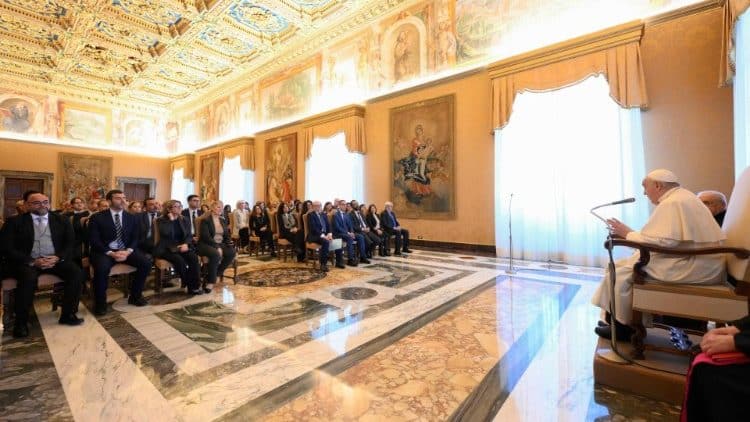“We are all responsible for preserving the patrimony to guarantee the resources necessary to continue the journey for those who come after us as well”. This is written by Pope Francis in the letter sent in recent days to the people who work in the Secretariat for Economic Affairs (SPE), now published on the website of the dicastery.
Francis announced it during the audience with the SPE staff on Monday, November 13th. “Looking back and observing the current situation – writes the Pope – I cannot help but see the much progress made. I thank you because you carry out a delicate and complex service. The work done to provide the Holy See with tools aimed at ensuring that its patrimony is oriented to the mission, avoiding the risks of falling back into the errors of the past that we all know”. Francis cites Cardinal George Pell, the first Prefect of the SPE, and his successor, Fr. Juan Antonio Guerrero.
“What has been done – it is read again in the letter – should not make us think that the path of economic reforms is over. On the contrary, it is only the beginning” and the Secretariat for the Economy is “called to promote, in its field, a constant movement of change towards the best”. Reform, explains the Pope, “does not mean changing to show that things are necessarily done differently from the past. Change is a functional renewal in line with needs. Therefore, in some cases it is radical, in others it is an adaptation of what is already good: and the effects of these changes must be monitored as decisions may be taken that then need to be corrected”.
Pope Francis invites SPE staff to imagine the service to be carried out by thinking “about the role of a father towards his son… And it is a delicate job because even the best intentions of a father can translate into behaviours that should be avoided: being authoritarian instead of having authority; feared instead of respected and recognized; exercising power instead of making decisions feeling the responsibility of protecting the common good; keeping money without purpose instead of using it to make the mission grow and flourish, forgetting that the Church is poor because everything it possesses is not for itself, but to use it where it is needed in a disinterested way”.
The Pope explains that “loyalty to the mission and prudence are the virtues that must accompany them in their work, in the management of each matter, since the numerous responsibilities that have been entrusted to them expose them to the risk of small and large errors that must be avoided. One of the big mistakes is habit: the primacy of the formal over the real. They must find the ability to listen and be heard, to put their economic and legal skills and techniques at the disposal of those who turn to them to carry out the initiatives that make up the mission. The constant effort must be to support these initiatives, taking care to make them go back, not to the rule and to the technique as an end in themselves, not to the arbitrary will of those who have the responsibility of deciding or authorizing, but to the common good”.
“But they must also always have – adds Francis – the loyalty to say no when what is represented to them or what is found in the controls betrays the mission, when the individual interest of some prevails over the collective, when the rules are violated or artificially evaded to pursue goals alien to those of the Holy See and the Church… Loyalty means never becoming accomplices, not even pretending not to see, not even wanting to disappoint those friendships that, in a working community like the Holy See, are established, and it is beautiful that they are established”.
Therefore, it is a matter of “working with courage to make responsible decisions, even if they are not popular”. The Holy See, the Pontiff recognizes, “registers a significant deficit every year. In fact, the whole organization is for the mission and the sources of funding are limited. But we know that, if a deficit is experienced, this means that part of the patrimony is eroded and this compromises the future. This is why a reversal of the trend is necessary. This awareness must be acquired at all levels of our community: we are all responsible for preserving the patrimony to guarantee the resources necessary to continue the journey for those who come after us as well”. This “requires us to free ourselves from rigidity and to make ourselves available, with sincerity, to updating. With loyalty and prudence, this can be achieved.”
Pope Francis concludes: “We must protect the patrimony when we are in a position to do so, and we must also invest it wisely and ethically, so that the fruits of management are shared equitably and everyone has what they really need. Investments should not be aimed at speculation or accumulation. Balance sheets and budgets should not be a sterile accounting exercise, but should represent the effort to support the mission of all by distributing resources according to real needs, even if this sometimes means asking someone to step back or share their income with others.”










